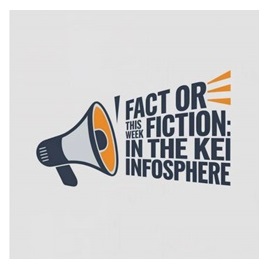|
The AI Engine: Design, Development, and Destiny |
DIRECTORY | ||
|
Contributions: AI and OUR Future - Lessons Learned from the Series HERE |
Action: Help sustain KEI's contributions |
Fact or Fiction?
Democracy Is Being Tested HERE ChatGPT is Superficial HERE |
|
|
Editor - Perry Kinkaide |
The KEI Network’s series AI and OUR Future carried us across eight episodes, examining how artificial intelligence is transforming productivity, healthcare, education, communications, security, and governance. We began with an introduction to AI as a force reshaping human agency and concluded with governance—how societies might regulate and direct its course. AI safety researchers warn that should something like AGI be created, humanity may no longer control its destiny. For the first time, we could be toppled as the dominant species in the known universe (Mustafa Suleyman, The Coming Wave). |
||
|
What the series did not probe deeply was the engineering of AI itself—the machine, the infrastructure, and the destiny of its design. This issue fills that gap, setting the stage for an upcoming webinar where experts will explore the promise and the peril of AI’s design and development. — Editor |
|||
|
The AI Engine: Design, Development, and Destiny Until recently, most of AI’s inner workings were a mystery even to its creators. Neural networks, with billions of parameters, could deliver astonishing outputs without a clear map of how decisions were made. From Black Box to Blueprint: The Algorithmic Challenges. Over the past decade, progress has centered on four interconnected breakthroughs:
One unresolved issue in AGI’s design is whether consciousness is required for true intelligence. Scholars and engineers remain divided – see also HERE:
Human development suggests intelligence can emerge in stages before self-awareness, hinting that consciousness may be emergent rather than causal. From a behaviourist perspective, consciousness may be only a byproduct of network activity. If it is unnecessary, AGI may arrive sooner as a powerful but unconscious force. If it is essential, the journey is longer—requiring breakthroughs not only in algorithms and hardware but in understanding the nature of awareness itself. The solution may even involve some form of integration of AI and Bioscience. HERE Algorithmic ingenuity to date has been remarkable—but is reaching a point where it is colliding with physical ceilings and systemic costs. Continued below
No need to register. Just Zoom in https://us02web.zoom.us/j/84258596166?pw..PANEL Osmar R. Zaïane - is a Professor of Computing Science at the University of Alberta, a Canada CIFAR AI Chair, Fellow of the Alberta Machine Intelligence Institute (Amii), and Fellow of the Canadian Academy of Engineering. He earned degrees from the University of Tunis, Paris XI, Laval, and Simon Fraser University, where he completed his PhD under Jiawei Han. Formerly Scientific Director of Amii, he has authored over 450 peer-reviewed papers and supervised more than 90 graduate students and postdoctoral fellows. His research spans artificial intelligence, machine learning, data and web mining, multimedia information retrieval, social network analysis, and health informatics, with applications in medical imaging and precision health. Recognized with awards including the IEEE ICDM Outstanding Service Award, ACM SIGKDD Service Award, and CS-CAN/INFO-CAN and CAIAC Lifetime Achievement Awards, Zaïane has also served in leadership roles with ACM SIGKDD and as Editor-in-Chief of SIGKDD Explorations. Werner Biegler - is a Canadian entrepreneur based in Edmonton. He co-founded Varafy, an edtech startup launched in 2014 that helps instructors create STEM homework problems with full worked solutions. He led Varafy through its exit to Chegg in early 2021, after which he served as Senior Director of Product Management there until late 2023. Biegler holds a Bachelor of Business Administration from the University of Regina and an MBA from the University of Saskatchewan. He is also active as an angel investor and mentor to startups. Bruce Matichuk - is a Canadian technologist and entrepreneur based in Edmonton, Alberta, currently serving as Chief Technology Officer at MedWatch Technologies. THE ORG He has co-founded multiple ventures, including Meritopia Inc., Tapestry Systems, and Xymbiant Systems, and has worked in AI, health tech, and software development. THE ORG+2LinkedIn+2 Bruce holds a PhD in Computing Science from the University of Alberta and dual MBA degrees. THE ORG He also teaches as a sessional lecturer at the JR Shaw School of Business. Bill Jones - has extensive business experience, founding and operating Altamonta Group — a global consulting firm serving governments, real-estate, energy, and financial clients. He is currently developing a data centre for Alberta. He has recently been called upon by the KEI Network to speak on issues of sovereignty and Canada’s geo-political relationships, particularly in the context of Canada-U.S. ties. Continued from above Infrastructure Challenges: Chips, Power, and Physical Limits. The path to AGI is also an engineering mega-project, constrained by material and energy bottlenecks:
Infrastructure is as central to AI design as algorithms themselves. The blueprint of AGI will be sketched not only in code but in silicon, steel, and kilowatt-hours. Financing Challenges: Cost, Concentration, and Competition. No less daunting are the financial realities shaping AGI’s future:
Financing is no longer simply a question of markets—it is a question of global power. Regulation at the Design Stage. Governance usually lags behind innovation. But for AI, regulation may need to start at the blueprint, not after deployment. Proposals include:
Whether such measures can keep pace with innovation—or whether innovation will route around them—remains an open question. Mustafa Suleyman argues that AI poses an existential threat, and that containment of AI is thetefore critical. That societal acceptance of surveillance is inevitable. "In the face of mankind losing control, public tolerance for potent measures in the name of safety appears high." Design Is Destiny. AI’s impact will not be determined only by how it is used—but by how it is built. Its design, infrastructure, financing, and perhaps consciousness itself will shape its destiny. The blueprint is being drawn now.
SOVEREIGNTY - "Getting to Yes with the US" 4:30 - 9:00PM Thursday December 4th Union Club, Victoria, British Columbia
|
||||||







